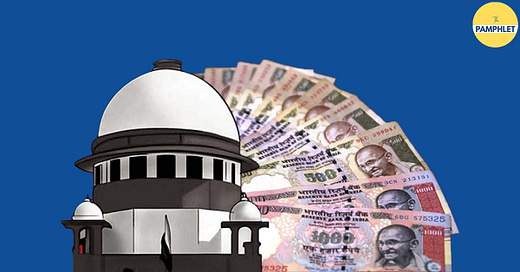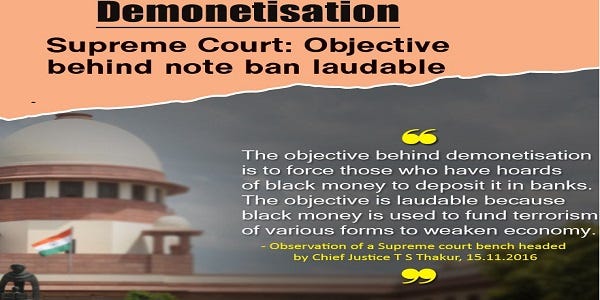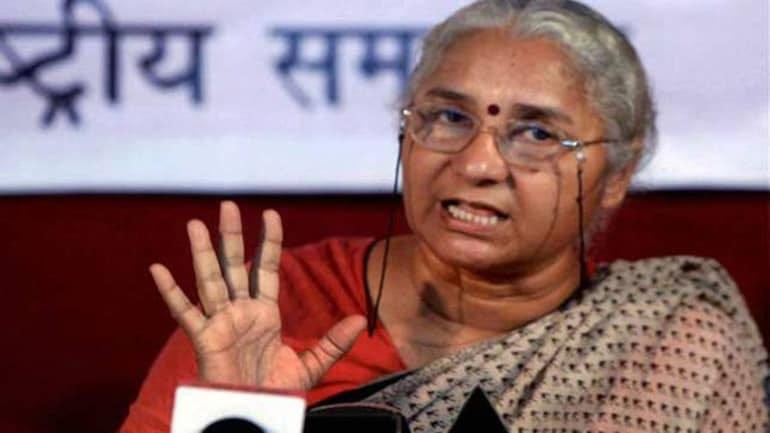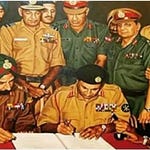A version of this essay was published by thepamphlet.in at https://www.thepamphlet.in/en/shadow-warrior-a-deplorable-supreme-court-decision-on-demonetization/
The Supreme Court, in a 4:1 judgment, held that the 2016 Demonetization was acceptable. The dissenting judge, well, dissented, saying that it was flawed. This decision sets an awful precedent that will come back to haunt us all, and the judiciary is respectful of precedent. The law of unintended consequences will strike.
It is not that demonetization per se was a bad idea, or that it was executed poorly, or that its goals were not met. It was a pretty good idea, it was executed moderately well, and the declared goals, to reduce corruption, terror funding through counterfeit notes, and to increase the proportion of ‘white’ money in circulation, were met to an extent.
No, the problem is twofold: one, an unprecedented and unwarranted level of judicial overreach and encroachment into the domain of the Executive; two, the common sense principle of fait accompli: this is a done deal, and it is essentially impossible to undo it.
The point is that the judiciary has its role, which is in hair-splitting legal jargon and in particular the verbiage of the Constitution. With all due respect, judges are not trained in other disciplines, and would be hard-pressed to understand economics, or engineering, or medicine, or military affairs. They simply will not be able to make judicious decisions (to give them credit, the majority opinion did concede this). But then, they should not take up such cases in the first place.
I can imagine motivated petitioners waiting in the wings to now ask the Supreme Court to undo the 1971 Bangladesh War, the decision to impose covid-related mandates, or the Mangalyaan space probe. In fact, you could find somebody to make a cogent argument that the Constitution should not have been accepted in 1950, and that it should be rolled back.
There is no end to such litigation, and if it is allowed to proliferate, it would clog up the entire judiciary. Of course, the entire judiciary is already clogged up with 30 million cases, so why open the flood-gates and invite more frivolous litigation?
As for the law of unintended consequences, there is the recent experience of the Democrats in the US. After years of claiming ex-President Trump’s tax returns would reveal deep, dark secrets, they forced him to reveal them: and it was a damp squib, with nothing of significance, no tax evasion. But the precedent has been set, and the Republicans will now use this to harass every Democrat alleging skeletons in their tax closets.
The Indian Supreme Court should stick to its fundamental task: interpreting the Constitution. Not being a lawyer, I cannot say authoritatively that there is no constitutional issue in the anti-demonetization lawsuit, but I doubt it. It is a purely administrative issue, and thus the domain of the Executive, just as making a multitude of daily decisions is.
The activist Indian courts have long been accused of interfering in everything while at the same time creating cozy little fiefdoms for themselves, for instance in the continuous creation of post-retirement sinecures for judges, the most recent being the demand that retired judges should be on the committee choosing the Chief Election Commissioner.
The most obvious example of bad faith is the judiciary’s closed and opaque Collegium system, wherein they nominate and appoint themselves, with the predictable result of nepotism and hereditary elites. It is high time that Parliament put a stop to this, and created new laws that mandate a role for the Executive. The proposed NJAC could be one way forward. If the NJAC is unconstitutional, well then, bring in a constitutional amendment.
Many people have talked about judicial reforms; I too took a stab at it a few years ago (“Can we fix the deeply troubled judiciary?” Swarajya, May 2018). One of my points was the radical restructuring of the system into a Supreme Court that only hears constitutional cases, and a new set of regional Courts of Appeal, with status almost equivalent to the Supreme Court, that hear other things beyond the ken of state High Courts.
There is a serious concern about which cases the Supreme Court chooses to hear. At the moment, it appears whimsical. Why on earth would the SC hear cases about cricket, which is a mere entertainment? Why on earth would the SC not hear petitions about the 1990s ethnic cleansing of Kashmiri Hindus (it has refused to do so three times already).
The terror onslaught in Jammu and Kashmir is not history. We saw with horror the terrorist attack on Hindus in Jammu’s Rajouri just days ago, where the attackers reportedly identified Hindus by their Aadhar cards, and then shot them. This is an urgent, ongoing problem, and why does the court refuse to hear it, while at the same time accepting a case on the 1948 assassination of Mahatma Gandhi? Next, someone will file a PIL demanding the undoing of that assassination.
Why does the SC accept PILs (Public Interest Litigations) put up by motivated NGOs, often with foreign funding? These people are able to get, through the back door, rapid decisions that affect the entire country, whereas the cases should properly be heard at the local level in District Courts, and only be elevated to the Supreme Court through a proper process if they actually have merit.
Apart from this, some actions are virtually impossible to undo: time and tide wait for no man. How could the SC, like King Canute who ordered the waves to retreat, even possibly consider the undoing of demonetization? How will it be done? What about the major moves in digitization that resulted, the UPI revolution, the trillions of rupees flowing through a payment system that is now ubiquitous and available to anyone with a mobile phone?
India has now become one of the most digitally connected countries in the world, but the amount of cash in the system is now even greater than at the time of demonetization. Can the court explain why? So it is not as though cash suddenly disappeared. Yes, there was a temporary crunch, and yes, it was hardship for many, but on average, most people have recovered.
Malign NGOs have continually opposed national interests: remember Sterlite? Or the Sardar Sarovar dam? By accepting a plea that was clearly inappropriate, probably politically motivated, and in any case something that would be virtually impossible to undo, the Supreme Court has set a poor precedent.
The Indian judiciary acts as a law unto itself, unaccountable to anybody else. This is wrong. As the President and the Vice President mentioned recently, it is time the judiciary reformed itself. I suspect it will have to be done forcibly, not voluntarily.
1090 words, 3 Jan 2023















Share this post